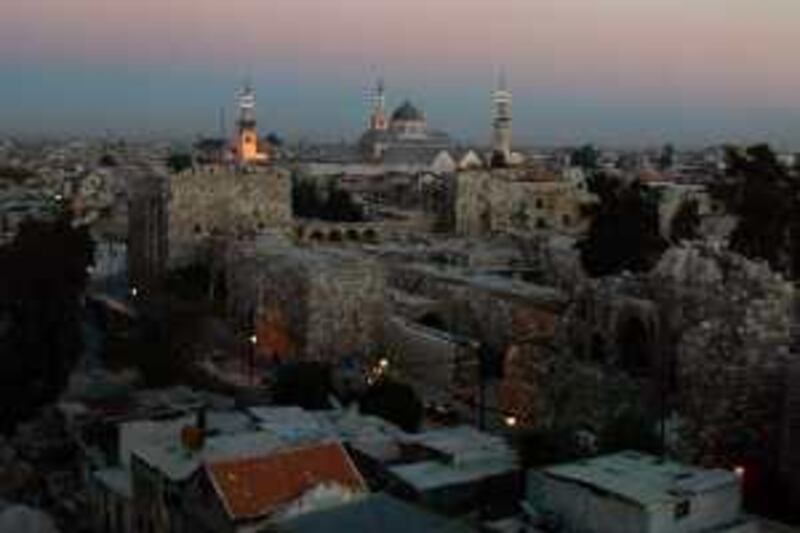The International Monetary Fund (IMF) in October issued a report that gave Syria's economic reformers more than a passing grade. With the rest of the global economy hanging on by a thread, Syria can expect its non-oil GDP to grow at a rate of 6.5 per cent, half a percentage point faster than its 2007 level. The timing of liberalisation - Syria began the process only four years ago - could not have been better; the toxic-debt virus unleashed by Wall Street is unlikely to infect the country's infant banks, forecasts the IMF, "given their limited integration with the global system".
The same could be said for much of the Levantine Middle East. From Alexandria to Riyadh, reformers have redeemed neoliberalism as a catalyst for what had been some of the world's most stagnant economies. Growth throughout the region is expected to average about 6 per cent, owing largely of its low debt levels and the dismantling of trade barriers. Regional commerce as a percentage of aggregate GDP, once insignificant, is at record levels. Budget deficits are declining and direct foreign investment is on the rise. Currencies that were once tightly controlled now trade freely and have survived the brunt of the worldwide credit crunch more or less intact.
Measured against such humbled financial centres as New York, Shanghai and Dubai, the restraint exercised by the regimes of the Old Middle East seems judicious. Indeed, authorities in Damascus report a net capital inflow as Syrian expatriates transfer funds from damaged banking systems abroad. On paper at least, such a reversal of fortune is impressive. But there is enough froth in the Levantine boom to suggest a destabilising bubble rather than a broad-based and deeply rooted revival.
Despite rising liquidity levels, jobless rates throughout the region hover at double-digit levels, while the cost of such staple goods as bread and heating oil have leapt beyond the reach of lower-income consumers. Meanwhile, the region's once-vaunted middle class - or what's left of it after decades of war, dislocation, occupation and economic embargoes - still has little to show for several years of liberalisation.
To be fair, the regimes have no control over commodity prices, particularly as they go about the painful business of lifting subsidies. But there is one sin for which they do bear responsibility, either by commission or omission: an unacceptable level of corruption. There was a time, so goes a common conceit among those old enough to remember it, when corruption was more about patronage than personal enrichment. It was a tactical concession towards a strategic end - the Arab nation, for example, or national cohesion. Nowadays, there is less honour in the art. Hovering around the seats of power are investors who have leveraged the sale of state assets to their pecuniary gain.
So what's the problem? Why, one could reasonably ask, should the Arab world be any different from anywhere else - up to and including the world's largest economy? Was it not the Bush White House, with its lack of transparency and contempt of the public trust, that contributed to America's own culture of corruption? The collapse of Enron eight years ago and the Bernard Madoff scandal that erupted last month are to Mr Bush's war on middle-class America what the Gulf of Tonkin resolution and the Mayaguez incident were to the US war on North Vietnam: the opening and closing acts of a national nightmare.
By all means, mark well the decline of the US as a standard of ethical probity. But note also the Arab world's poor ranking in several reports conducted with ample local input. The UN's landmark 2004 study, prepared almost exclusively by Arab specialists, details how 90 per cent of people surveyed in five countries believed that political and economic corruption were pervasive. The report stated that people in power monopolise the main sectors of the economy, "either directly or as 'partners' of successful businessmen". In particular, it cited the invidious trend of "new financial elites... characterised by corruption and tyranny [resulting] in the escalating impoverishment of the middle classes and the marginalisation of the intermediary sectors that provide temporary occupations in many Arab countries".
More recently, an Oct 2007 report by the Berlin-based Transparency International said that "corruption and lack of transparency [in private and public-sector deals] still constitute a very important challenge for the development of the [Middle East] region". It was the alarming condition of flat economies and rapid population growth rates that convinced Arab leaders to open their markets in the first place. Progress has been substantial, at least when measured by the yardsticks of the IMF and the World Bank. But the facts on the ground suggest the "smoking" economy could be snuffed out as quickly as it was ignited. What would the regimes have to offer then?
Stephen Glain is a business columnist for The National and the author of Mullahs, Merchants and Militants: The Economic Collapse of the Arab World. sglain@thenational.ae





